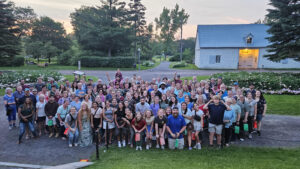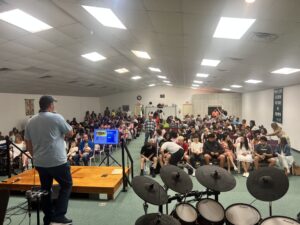
RICHMOND, Va. (BP)–Southern Baptists are poised to set another record for short-term volunteer projects overseas — with astounding impact both abroad and at home.
But while missions leaders continue to call for even more volunteers, they are reminding Southern Baptists to be sure overseas ministries encourage — and not hinder — the development of evangelistic, multiplying churches that know how to trust God for their needs.
Southern Baptists continue to step up in record numbers to serve in short-term volunteer projects overseas, said Bill Cashion, director of the International Mission Board’s volunteers program.
Last year, 26,741 volunteers participated in projects facilitated by the agency, and the board is on a course for 30,000 this year, Cashion said. That compares to 12,756 volunteers in 1994 and 6,066 in 1984.
“Today, short-term volunteers play a very, very significant role in IMB overseas strategies,” Cashion said. “Twenty years ago, many people wondered whether God could actually use volunteers to win people, disciple them and see churches started and churches strengthened.
“Over the years, there has been a major shift in attitude basically because we have seen God do mighty and wonderful things through volunteers,” he said. “Now, missionaries around the world more and more are including volunteers, not as an add-on to their strategic plans, but in some cases it’s the hub of the wheel.”
The impact of volunteers has been enormous, both at home and abroad, added IMB President Jerry Rankin.
“The growing participation of short-term volunteers in overseas strategies has accelerated evangelistic harvest and enhanced our impact around the world,” Rankin said. “But it also is an obvious factor in the successive years of record missionary appointments, record levels of giving to the Cooperative Program and Lottie Moon Christmas Offering, and increased involvement in intercessory prayer for missionaries and the nations.
“Most pastors would testify that getting their people personally involved in international missions has resulted in greater commitment to local witness and outreach as well.”
Veteran missionaries realize, however, that missions efforts sometimes can harm as well as help, no matter how good the intentions. Sometimes projects create a welfare mentality that hinders church growth.
“Over many years, missionaries have recognized it is a mistake to try to accelerate growth by an infusion of financial aid to build churches and support pastors,” Rankin said. “Well-intended financial assistance too often creates dependence and handicaps the initiative and faith essential for spontaneous growth.”
Cashion wonders if Southern Baptists themselves would be as strong as they are if others had “helped” them like many Americans are tempted to assist Christians overseas.
“When Southern Baptists were a pioneer people, who came and bought our land, built our buildings and paid our pastors?” he asked. “Nobody did. So our forefathers had to do more faith building than they did building building.
“We need to be sure we don’t cheat other people out of that same faith-building opportunity,” Rankin said.
No matter how many missionaries and volunteers are sent, the task of world evangelization is too large for Southern Baptists alone, Rankin noted.
“Everyone in the world will have access to the gospel only when our strategies result in a multiplying network of local New Testament churches that are able to grow and reproduce without being dependent on foreign assistance and resources,” he said.
“We are seeing phenomenal church planting movements in many areas of the world, but it is not happening where churches have come to expect Americans to provide them with facilities in which to worship or are dependent on someone else providing support for their pastor.”
There always will be a tension between facilitating what volunteers want to do and what is most effective in the long-range strategy of missionaries on the field, Rankin said.
“Our field leadership in responsive places, such as Middle America, struggles with the tension between utilizing a massive number of volunteers and channeling their efforts into beneficial strategies,” he said. “Our desire is to unleash an indigenous church planting movement in which churches exist, grow and multiply within their own culture and economy without any dependence on foreign resources, but that often is deterred by excessive help from abroad.”
The challenge is for Southern Baptists to really hear where God is calling them to serve — and then be obedient, Cashion said.
“God is doing a great work in the far corners of the earth, and he is inviting us to be part of what only he can do,” he said. “I believe God is saying to us, ‘I am big enough to cover this entire world. I’ve got plenty of you to go into Latin America, and I’ve got plenty of you to go into Africa and Asia and Europe as well.’
“We’re seeing people starting to respond to that call now, but we need to see more,” Cashion said. “God is big enough, and if we’re obedient we have the people to go into all parts of the world with the good news of God’s love.”
–30–
To learn how to serve as a volunteer on a short-term mission trip, e-mail [email protected] or call 1-800-888-8657.















